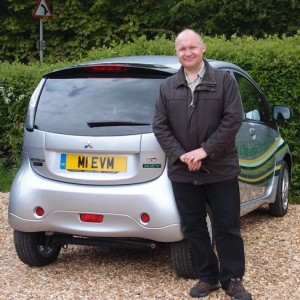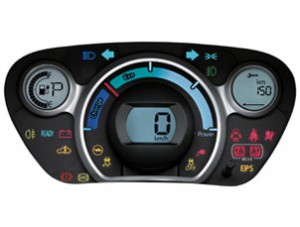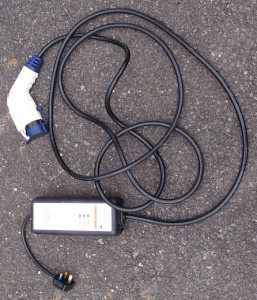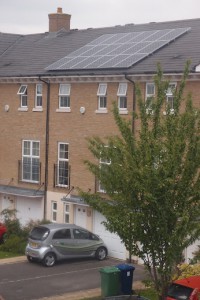 I was asked by a friend, Barrie, to test drive a Mitsubishi i-MiEV for the weekend sometime and I had a few trips to make this weekend I agreed to give it a go. It came from Humphris on Rose Hill where he works – apparently they wanted the view of a councillor! I picked the car up on Saturday morning and was quite pleasantly surprised at how similar to any other small automatic it was in driving style and appearance. You even have a key to put in the “ignition” to turn it on and “start” the electric motor.
I was asked by a friend, Barrie, to test drive a Mitsubishi i-MiEV for the weekend sometime and I had a few trips to make this weekend I agreed to give it a go. It came from Humphris on Rose Hill where he works – apparently they wanted the view of a councillor! I picked the car up on Saturday morning and was quite pleasantly surprised at how similar to any other small automatic it was in driving style and appearance. You even have a key to put in the “ignition” to turn it on and “start” the electric motor.
Once home I had a good look around the car inside and out. As it has no internal combustion engine it has electric power steering and there is a dedicated electric vacuum pump to provide the brake servo assistance. The brakes feel very normal, just like on any car of that size. Under the bonnet there is a 12v battery just like in a petrol or diesel car – it’s used for lights, wipers internal fans, indicators and so on. It also controls the electrics that manage the main traction motor and the big traction battery. The traction battery is huge and sits at the rear of the car under the back seat. It produces around 300v DC which is converted to 3-phase AC current to drive the traction motor. For those interested it produces about 66PS which is about the same a 1.1 litre small petrol car. The torque curve is very different though, with the electric motor having good torque right from a standstill, unlike a petrol engine which won’t do much at all below 1000rpm. The flexibility of the electric motor means that the car only has one gear as the motor can cope right through the speed range and reverse is just achieved by running the motor backwards. There is no clutch either as a motor doesn’t need it. There is no spare wheel but instead a tyre repair kit and a small compressor for re-inflation. A tiny gripe with the interior is that there is no clock so you can’t see what time it is very easily.
 The first journey was a little drive up to the ring road then back down Brasenose Driftway and Crescent Road to see how it coped with the downhill run. As well as “Drive” mode the car also has “Braking” and “Comfort” modes – they are really just variations on a theme. Regenerative braking is used in all modes, an average amount in D, more in B and less in C. The car slows down quite rapidly to about 10mph in B mode with your foot off the accelerator, giving the battery a little charge while it’s doing it.
The first journey was a little drive up to the ring road then back down Brasenose Driftway and Crescent Road to see how it coped with the downhill run. As well as “Drive” mode the car also has “Braking” and “Comfort” modes – they are really just variations on a theme. Regenerative braking is used in all modes, an average amount in D, more in B and less in C. The car slows down quite rapidly to about 10mph in B mode with your foot off the accelerator, giving the battery a little charge while it’s doing it.
I got braver then and went with some friends up to Watlington Hill for a walk. We took the A40 and the M40 up to the Lewknor turn and while the car felt perfectly safe and stable at 70mph on the M40 (top speed is rated at around 80mph) it was eating the charge in the battery at an alarming rate so we slowed to 60mph. The car is definitely happier at City Speeds. Up to about 50mph it is pretty efficient. There is a power gauge on the dashboard and the trick is to keep the needle in the “eco” area as the economy is far better then.
Later on Saturday we did the supermarket run in the i-MiEV. Again fine but the boot is rather little – we filled it with what I’d call a smaller than average weekly shop.
On Sunday I drove into Oxford and then out to Cumnor to lead worship at the United Reformed Church there. The car ran beautifully. For lunch I took Gordon to the Bat and Ball at Cuddesdon then in the early evening I visited Wolvercote to babysit my nephew Oliver for a few hours. I was glad of the small size of the i-MiEV in Wolvercote as my sister and her family live on a small side road with extremely tight parking!

Charging the car is achieved with a mains cable that is 5 metres long so quite easy to use if you have a driveway. It takes 7 hours in total to charge the car from flat and does so at a rate of 3kW so uses about 21kWh of electricity to do it. At today’s prices that costs about £2.50 – £3. A full charge claims to do 90 miles and I reckon I’ll get pretty close to that if I stay off motorways. In comparison, an efficient similarly-sized petrol car would probably use about 9 litres of petrol to do that, costing £12.60 at today’s £1.40/litre fuel price. That’s quite a significant difference! For someone with a daily commute up to about 20 or 30 miles away it would save a fortune in petrol or diesel costs! You can also get a fast charge cable to use in dedicated charging points – this charges at 50kW and takes about half an hour to get the battery to 80%.
 All in all I am impressed with the i-MiEV. I could easily cope with it as my main car as almost all journeys I make are shorter than 20 miles and it’s rare to need to go over 50mph in and around Oxford. For the odd weekend away and the summer camping trip it would not be outrageous to hire a car as that can be done pretty cheaply and conveniently these days. As electric plug-in cars get cheaper and their range gets longer it may well become a serious proposition for the masses in a few years’ time. It makes particular sense if, like us, you have a Solar PV installation so you can charge the vehicle with electricity you’ve generated yourself. At the moment the prices are too high and battery life (i.e. number of charges) is still uncertain but I’m sure this will all change in time.
All in all I am impressed with the i-MiEV. I could easily cope with it as my main car as almost all journeys I make are shorter than 20 miles and it’s rare to need to go over 50mph in and around Oxford. For the odd weekend away and the summer camping trip it would not be outrageous to hire a car as that can be done pretty cheaply and conveniently these days. As electric plug-in cars get cheaper and their range gets longer it may well become a serious proposition for the masses in a few years’ time. It makes particular sense if, like us, you have a Solar PV installation so you can charge the vehicle with electricity you’ve generated yourself. At the moment the prices are too high and battery life (i.e. number of charges) is still uncertain but I’m sure this will all change in time.
I must say I was surprised at how drivable and comfortable the i-MiEV is. It feels very much like a small auto with continuously variable transmission and I got used to it very quickly. It will never win any speed trials but around town it’s perfect – it has good acceleration from a standstill and has the great advantage over a petrol or diesel car that when it is stationary, even just in traffic, it is using no energy at all. It emits zero Carbon Dioxide (although of course the electricity has to be generated somewhere and that might produce CO2) and is virtually silent in running. Its small size, with very little outside the visible area at the front or back makes it an absolute breeze to park.
I shall be sorry to return it on Monday morning!
 I was horrified to read the column from the Labour Leader of the City Council in my copy of “Your Oxford” (the City Council’s twice-yearly public information newspaper) as it makes some very basic errors about benefit reform and was nowhere near being balanced or even handed.
I was horrified to read the column from the Labour Leader of the City Council in my copy of “Your Oxford” (the City Council’s twice-yearly public information newspaper) as it makes some very basic errors about benefit reform and was nowhere near being balanced or even handed.







